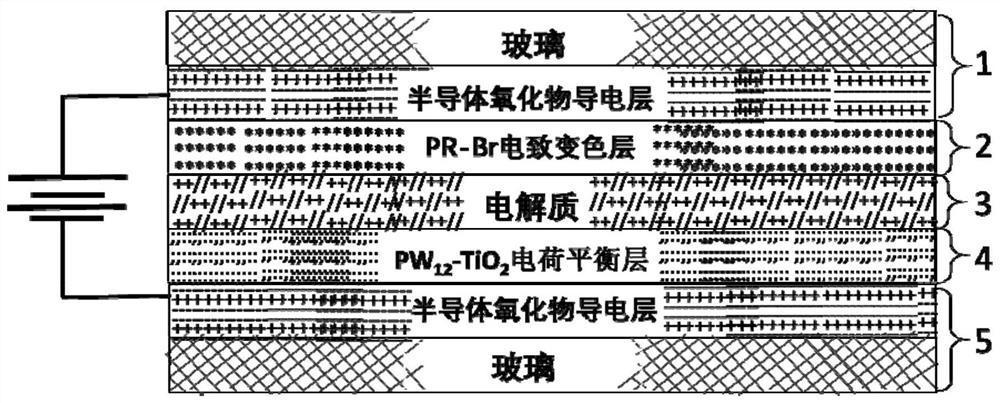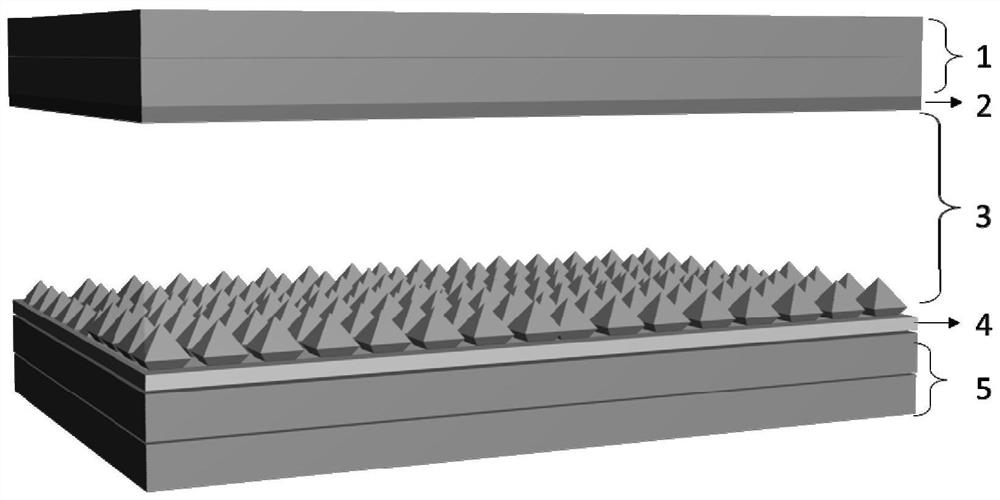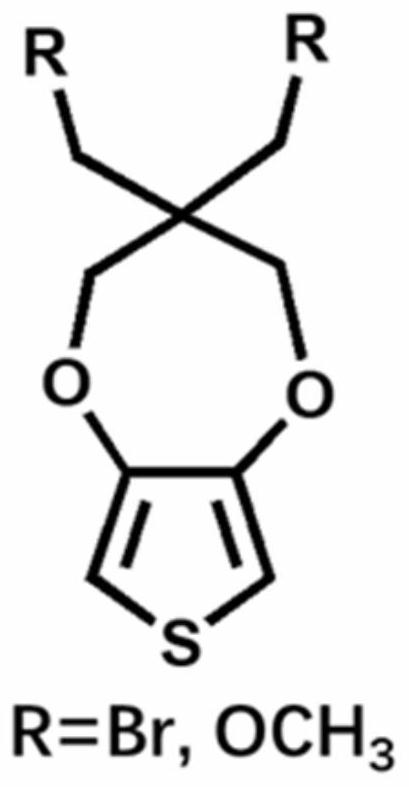A high-performance electrochromic capacitor dual-function device and its manufacturing method
An electrochromic and capacitor technology, applied in instruments, nonlinear optics, optics, etc., can solve the problems of insignificant color change during charging and discharging, poor cycle stability, etc., and achieve the effect of high specific capacitance and high color contrast
- Summary
- Abstract
- Description
- Claims
- Application Information
AI Technical Summary
Problems solved by technology
Method used
Image
Examples
Embodiment 1
[0037] (1) Preparation method
[0038] 1. Fabrication of working electrode:
[0039] In turn, 0.3 g FeCl 3 ·6H 2 O, 0.2g polyoxypropylene polyoxyethylene copolymer (molecular weight 2800g mol -1 ) and 0.05g 3,4-(2',2'-bis(bromomethyl)propylenedioxy)thiophene (structural formula such as Figure 2a shown) was dissolved in 0.8 g butanol and sonicated for 5 min at room temperature. Then, the obtained mixed solution was filtered through a hydrophilic syringe filter, and uniformly coated on the ITO conductive glass substrate by spin coating method. Wash off residual FeCl with ethanol 3 After drying with nitrogen, the FTO conductive glass loaded with polymer film (PR-Br) was obtained as the working electrode.
[0040] 2. Production of counter electrode:
[0041] 2.1) Using commercial TiO 2 Slurry (purchased from Greatcell, specification: TiO 2 particle size 18nm). The purchased TiO was treated with ethanol 2The slurry was diluted into a suspension with a mass fraction of 2...
Embodiment 2
[0048] (1) Preparation method
[0049] 1. Preparation of working electrode:
[0050] Sequentially add 0.3g FeCl 3 ·6H 2 O, 0.2g polyoxypropylene polyoxyethylene copolymer (molecular weight 2800g mol -1 ) and 0.05g 3,4-(2',2'-bis(bromomethyl)propylenedioxy)thiophene (structural formula such as Figure 2a shown) were dissolved in 0.8 g butanol and sonicated for 5 min at room temperature. Then, the resulting mixed solution was filtered through a hydrophilic syringe filter, and evenly coated on the ITO conductive glass substrate by the spin coating method. The control rotation speed was 1100rpm and the spin coating time was 10s to obtain a 175nm thick polymer film. Wash off residual FeCl with ethanol 3 After blowing dry with nitrogen, the ITO conductive glass loaded with polymer film (PR-Br) was obtained as the working electrode.
[0051] 2. Production of the counter electrode:
[0052] 2.1) Using commercial TiO 2 Slurry (purchased from Greatcell company, specification: Ti...
Embodiment 3
[0059] (1) Preparation method
[0060] 1. Preparation of working electrode:
[0061] Sequentially add 0.3g FeCl 3 ·6H 2 O, 0.2g polyoxypropylene polyoxyethylene copolymer (molecular weight 2800g mol -1 ) and 0.05g 3,4-(2',2'-bis(bromomethyl)propylenedioxy)thiophene (structural formula such as Figure 2a shown) were dissolved in 0.8 g butanol and sonicated for 5 min at room temperature. Then, the resulting mixed solution was filtered through a hydrophilic syringe filter, and evenly coated on the ITO conductive glass substrate by the spin coating method. The rotation speed was controlled to 1400 rpm and the spin coating time was 10s to obtain a 160nm thick polymer film. Wash off residual FeCl with ethanol 3 After drying with nitrogen, the ITO conductive glass loaded with polymer film (PR-Br) was obtained as the working electrode.
[0062] 2. Preparation of counter electrode:
[0063] 2.1) Using commercial TiO 2 Slurry (purchased from Greatcell company, specification: TiO...
PUM
| Property | Measurement | Unit |
|---|---|---|
| thickness | aaaaa | aaaaa |
| particle diameter | aaaaa | aaaaa |
| thickness | aaaaa | aaaaa |
Abstract
Description
Claims
Application Information
 Login to View More
Login to View More - R&D Engineer
- R&D Manager
- IP Professional
- Industry Leading Data Capabilities
- Powerful AI technology
- Patent DNA Extraction
Browse by: Latest US Patents, China's latest patents, Technical Efficacy Thesaurus, Application Domain, Technology Topic, Popular Technical Reports.
© 2024 PatSnap. All rights reserved.Legal|Privacy policy|Modern Slavery Act Transparency Statement|Sitemap|About US| Contact US: help@patsnap.com










